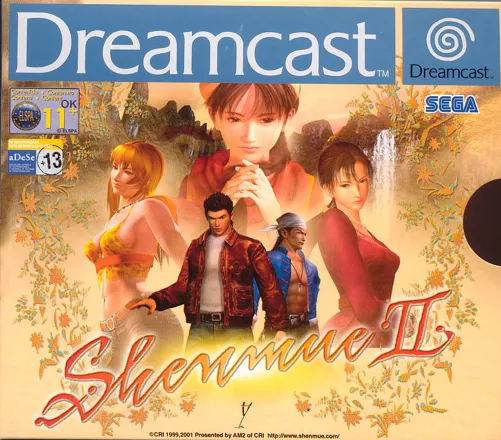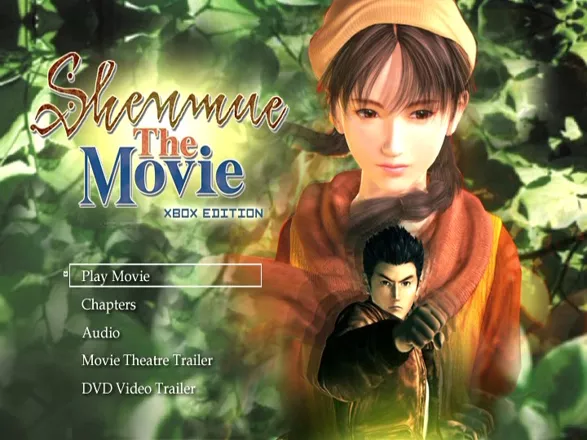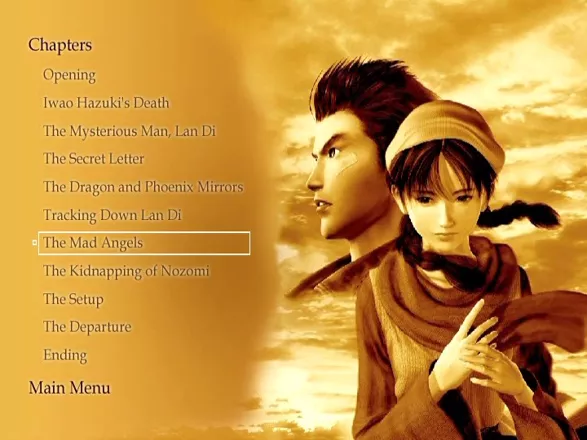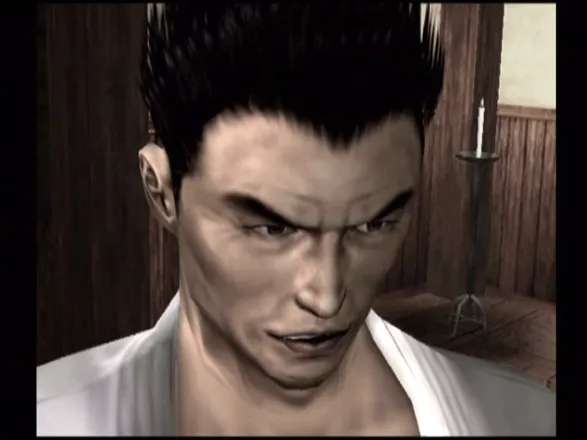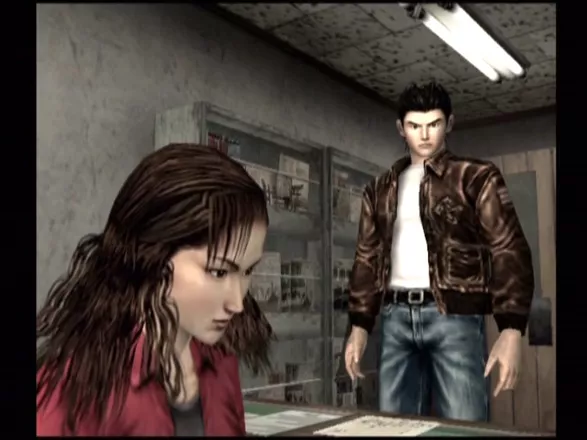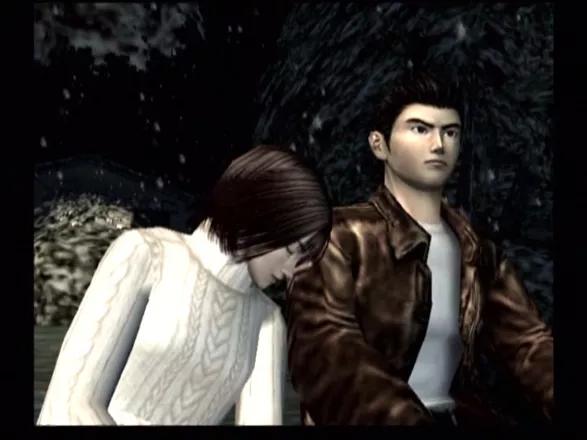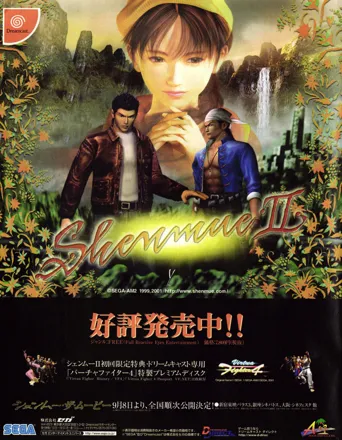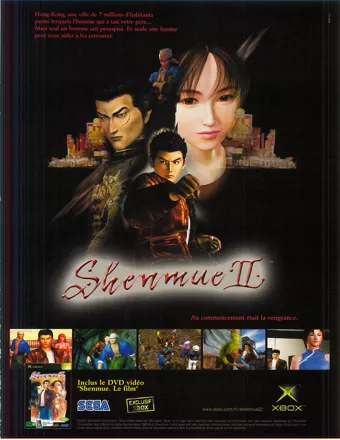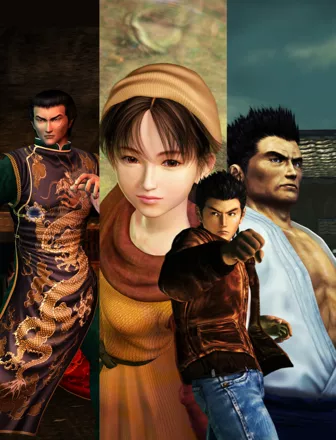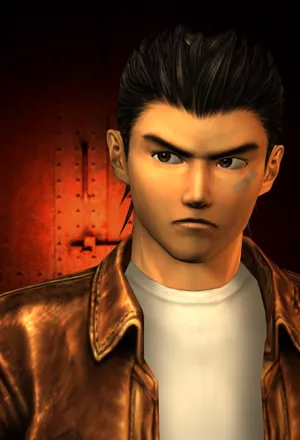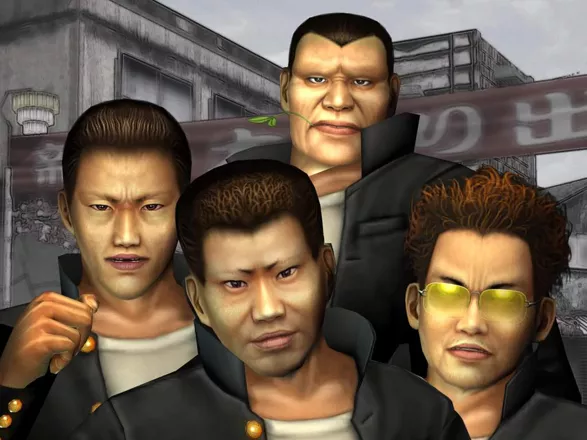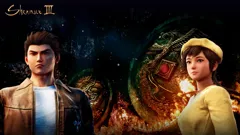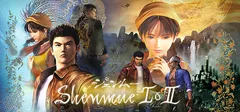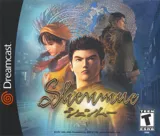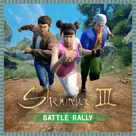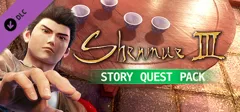Shenmue II
Description official descriptions
After his father was murdered by a mysterious Chinese man known as Lan Di, Ryo Hazuki swears to avenge his death. After a futile search for Lan Di in Yokosuka, Ryo is contacted by Chen Yao Wen, a Chinese master who advises him to travel to Hong-Kong and seek out Master Lishao Tao, who might be the only one who knows what had happened between Lan Di and Ryo's father in the past. Ryo arrives in Hong Kong and starts searching for a man who is his only link to the elusive murderer.
Shenmue II is a direct sequel to Shenmue, continuing its story. The game's structure and basic gameplay elements are similar to those of the first game, incorporating elements of adventure, fighting, and light role-playing within a life simulation experience. Ryo explores vast 3D environments, talks to people to gather clues, and occasionally participates in fighting sequences. Like in the previous game, Ryo can train to become stronger in battles, and gradually learns new moves, which constitutes the role-playing element of the game.
The game's environments are based on real locations in Hong Kong. The game world is significantly larger than that of its predecessor. The game also has a somewhat more linear story progression with numerous precise objectives, though free-form exploration is available during most of the game. Earning money plays a more important role, and many objectives are built around Ryo having to take part-time jobs (most of which are shaped like action mini-games) or participate in fights to win money. Like in the first game, Ryo can visit the arcades and play exact replicas of older arcade games, e.g. OutRun.
The sequel features a larger amount of characters who take part in the story. Some of them also accompany Ryo on his journey, helping him in fights or other dangerous situations. The game also noticeably increases the amount of quick-time events (QTEs). Several key sequences are composed entirely out of cutscenes during which the player has to rapidly press combinations of buttons in order to execute the correct action. Many major fights in the game also include extensive QTE segments, often serving as a culmination of the fight.
The Xbox version of the game comes with an additional DVD called Shenmue: The Movie, which contains a summation of the first Shenmue made into a feature-length movie.
Spellings
- シェンムーII - Japanese spelling
- 莎木二 - Chinese spelling (traditional)
Groups +
- Gameplay feature: Day / night cycle
- Gameplay feature: Deadline
- Gameplay feature: Importable characters
- Gameplay feature: Quick Time Events / QTEs
- Games bundled with movies
- Games with hidden / unlockable full games
- Middleware: CRI
- Setting: 1980s
- Setting: Chinese
- Setting: City - Hong Kong
- Shenmue series
Screenshots
Promos
Credits (Dreamcast version)
10 People
| Director of Product Development | |
| Localization Producer | |
| French Translator | |
| German Translator | |
| Spanish Translator | |
| Lead Tester | |
| Product Marketing Manager | |
| Localisation | |
| Design Co-ordinator | |
| Designer |
Reviews
Critics
Average score: 88% (based on 48 ratings)
Players
Average score: 4.1 out of 5 (based on 144 ratings with 3 reviews)
The Good
Shenmue II works extremely well as a sequel. Many of the original title's mistakes are corrected, and everything that made it great has been improved upon. The game's graphics are slightly more detailed and much more colorful. The environments provide a great deal more variety. The voice acting, heard here in the original Japanese, is more convincing and emotional than the dry English dub heard in the first title.
The Quick-Timer Events (QTE) from the first title are here as well; they are more common and better-executed than before, but they are not so common that they become tedious or take away from the game's sense of interactivity. Though not all gamers have spoken fondly of the QTE system, I happen to like it quite a bit, particularly in fight scenes. I am primarily an adventure and RPG gamer, and lack the hand-eye coordination to attain true mastery of 3D fighting games. In fact, I am pretty much a button masher. QTEs give me the opportunity to see Ryo perform exciting martial art feats that I would not be able to accomplish manually. Also, with the QTE system, the game's creators are momentarily freed from having to use camera angles suitable for a game, resulting in set pieces that are truly cinematic in scope and feel.
Speaking of camera angles, I must pay respect to the 3D "camera work" of Shenmue II. To date, it is the only fully-3D adventure game I have ever played in which I never had to fight with, or even think about, the camera. I was always looking at exactly what I wanted to see. Past 3D adventure games, such as Sierra's Gabriel Knight III, have had very clunky cameras by comparison, and constantly needed adjustment in order for the gamer to see what was necessary.
I am not qualified to speak in great detail about Shenmue II's fighting system, but I found it to be an improvement over the first title. It is possible that I was simply getting better as I played, but I found myself to be using a little more strategy and a little less button mashing than before. Also, the game features more one-on-one contests against intelligent and difficult opponents than in the first title. The original Shenmue tended more often to pit Ryo against large groups of anonymous and unskilled fighters.
It is also worth mentioning that Shenmue II features what is hands-down the best boss battle in any computer or console game of any genre that I have ever played. In pretty much any action or RPG game, your last battle differs very little from your first - you just use the "Attack" command (or hit the fire button) a lot more times. A pure one-on-one fighting game might get more complicated than that, but unlike in an RPG, you are typically under a 90 second per round time constraint. Shenmue II gives you the best of both worlds. There is no time limit, the opponent is very difficult, and the final victory is nothing short of spectacular. Near the level of a Rocky or Karate Kid film finale, this is where the Shenmue series comes closest to becoming perhaps the first true "interactive movie".
The characterizations are much improved over the first title in the series. While people often still speak to each other in the curt one- or two-word sentences displayed in the first Shenmue, one gets the impression that there's a bit more going on beneath the surface than before. The all-nice-all-the-time (and let's face it, a bit boring) Fuku and Nozomi are replaced by Joy, a blunt but kind-hearted motorcycle girl, Xiuying, a martial arts master with a past not unlike Ryo's, and Ren, a gang leader who becomes a tenuous ally. These are characters with their own motivations who reveal enough about themselves to be interesting, but hold enough back that they retain a feel of mystery. You will also spend a great deal of time getting to know Shenhua, the enigmatic peasant girl featured prominently in dreamlike sequences in both the first and second Shenmue titles. When she finally makes her appearance, she does not disappoint.
Shenmue II's pacing is much improved over the first title. Where Shenmue had the burden of introducing a 16-chapter story and dragged in some sections, this game is nothing but plot development from start to finish. Although it will take a bit longer to complete than the first title (say about 4-6 more hours), it contains four chapters of Yu Suzuki's original story rather than just one and should hold the gamer's interest all the way through.
Lastly, Shenmue II features perhaps the best and most intensely satisfying ending I have ever experienced in a console game (the field gets a little tougher if you include PC games - I'd have to think about that one). Anti-climactic endings are a common fault in the adventure game genre, but Shenmue II avoids that by treating the gamer to an ending sequence that is roughly 4-6 hours long depending upon your opinion of when the game actually "begins to end". I don't want to give anything away, but I will say that the game isn't shy about giving you a big payoff for all your hard work.
The Bad
The biggest problem with the Shenmue series was the fact that it came out on the Dreamcast, plain and simple. Sega suffered a series of setbacks in the 1990s after the success of the Genesis console, beginning with the expensive and confusing Sega CD (1992) and 32x (1994) upgrade packages. The Saturn (1995) only worsened the blow. The three packages were expensive, and had poor software support, many of the most popular titles overlapping with the Genesis. Who wanted to pay $400 for a Saturn so they could play a marginally better version of Mortal Kombat II than what they were already playing on their Genesis? Further, the three items were released so close together that the casual gamer simply didn't know what to buy. The Dreamcast was an excellent console that still holds up today, but it was not enough to dig Sega out of the hole they created. By that time Sony had built the Playstation into an empire, and with the amazing graphics and backward-compatibility promised by Sony for the Playstation 2, most casual gamers did not purchase the Dreamcast, choosing instead to hold off on their next-gen console purchase until they had seen what Sony could do. The Dreamcast became a console for early adopters (at the time of its release, no other console game close to the Dreamcast from a technical standpoint) and hardcore Sega believers. The Dreamcast was also plagued by the same poor third-party software support as the Saturn, 32x, and Sega CD - particularly in the RPG genre. Sega had barely anything to offer the RPG fan, as compared to Sony and the mighty behemoth that is Squaresoft. All of these elements conspired to make the Shenmue series little more than a cult favorite in the United States - and a very expensive one, at that. The first Shenmue holds a place in the Guinness Book of World Records as the most expensive computer game ever made. Budget estimates range from $20 to $80 Million! Obviously, high budget + low sales = not good.
Why does this matter to you? Well, you need to go into Shenmue II knowing that the story does not have a resolution, and we may never find out how it actually ends. Shenmue was conceived as a 16-chapter saga. The first game in the series covers chapter 1, and Shenmue II covers chapters 3-6 (probably explaining the game's better pacing as compared to the preceding title). Chapter 2, chronicling Ryo's boat ride from Japan to Hong Kong, was skipped. Creator Yu Suzuki's plan was to have the series span approximately five games and one or two computer-animated films. Now with the story having barely even begun, the Dreamcast is dead and Sega no longer has the funds necessary to release big-budget epics. It is entirely possible that we will never see another Shenmue game.
The news isn't all bad, though. Yu Suzuki's name still carries much clout in the industry, and he has expressed a desire to complete this series. As recently as Summer 2003, he stated that were Sega to give the go-ahead, he would proceed with development of Shenmue III, condensing the remainder of the original 16 chapters into one final series installment. In the Summer of 2004, the Shenmue.com website was redesigned, and an announcement was made: The universe of Shenmue will resurface as a MMORPG, Shenmue Online, to be released in China and Korea in Spring 2005. No US release date has been announced. It is a possibility that were the MMORPG to be a success, the profits could be parleyed into a third installment in the story-based series. Time will tell.
Returning the focus to Shenmue II: Some my find fault with the pacing of the game's final disc. It is, more or less, a two-to-three hour conversation between Ryo and Shenhua with brief spurts of interactivity. I love an opportunity to really get to know characters in an RPG or adventure game, but this may not be to everyone's liking. Furthermore, I was slightly disappointed by the supernatural elements in the game's ending. Up to this point, the story of Shenmue could more or less have taken place in the real world, and the fact that Yu Suzuki's Hong Kong is a world that lives, breathes, and goes on with or without you only serves to heighten the sense of realism. The introduction of supernatural elements breaks the gamer's suspension of disbelief, reminding him or her that this is, in fact, just a video game.
Lastly, in creating a world much larger and with much greater breadth than the original Shenmue, some of the first title's depth had to be sacrificed. For instance, the first title had a few markets where numerous (basically useless) items could be purchased. Although the fact that you could buy various snacks or a gallon of milk had virtually no bearing on the game's plot, it did add to the illusion of realism. Shenmue II, in contrast, has dozens of various shops, differing little from one another. In most cases, a shop is only window dressing. You can not actually browse or purchase any items. It is a small complaint, but Hong Kong doesn't necessarily live, breathe, and provide the same level of interactivity that Shenmue's Yokosuka did.
The Bottom Line
The world of console games is significantly different than that of PC games. In an industry that considers Tomb Raider to be an adventure game, it is somewhat logical that Shenmue II would be considered an RPG despite not really resembling a Final Fantasy-type title. Coming mainly from a PC game background, however, I think that Shenmue II is much closer to a traditional PC adventure game than it is to an RPG. This being the case, I believe that Shenmue II represents the most important step forward for the adventure game genre in several years. Okay, so it doesn't exactly have puzzles, but adventure games have always been more about letting the gamer interact with a story than using item A with item B to get item C. Game designers should really take note. This title has all the right pieces of something that could really revitalize the PC adventure game genre, if a publisher actually had the guts to invest in a major adventure project.
Shenmue II is first and foremost a really great story to take part in. And it isn't so much that the story is anything groundbreaking - the basic revenge plot has been done time and again - but never before in a console title has it been presented with such amazing style. From the opening cinematic to the spectacular climax and trailing action that follows, this title is an experience that should not be missed by anyone who really loves great games. Shenmue II is probably the greatest console game that I have ever played.
Dreamcast · by Eurythmic (2663) · 2004
A beautiful, inspirational game with good story, characters, graphics, and detail
The Good
This is one of my all-time favorites. I became really attached to the characters and loved the story. There's a feeling, as if you've entered a new world when you play this game. I love the martial-arts and history thrown into the mix. Also, the game calls for exploration. There is much to be done and a lot of it depends on the the actions you take and the decisions you make. I found some really classic events in this game.
The Bad
It ended.
The Bottom Line
It's one-of -a-kind. Games like this just to don't release everyday. It's a combination of rpg, adventure, and action. It's even more when you consider that it has emulated versions of classic sega arcade games. It's special.
Xbox · by J J (3) · 2004
The most beautiful game I've ever played.
The Good
At last the final great Dreamcast title is here. As Shenmue fans will recall the first game ended with Ryo leaving Japan for China on a ship, leaving us all hanging desperately for the next chapter to see what happens next. Part 2 picks up as the boat is coming into port in Hong Kong which ties the two games together perfectly. In fact it feels like the two games are just one enormous game they come together so well. The same adventure/fighting/quick timer event style gameplay is back but improved on in every area. The locations are far larger and more diverse than those in the first game with some of the most beautiful visuals ever produced by a Dreamcast. The fighting is much the same but the camera angles have been improved. When adventuring there are more options of conversation than before and impatient players can skip time ahead rather than waiting around for a certain event. One of the highlights of Shenmue 1 was the various ways you could waste time in the game, in part 2 there is even more to do. There are loads of gambling games to play, you can arm wrestle for money or even participate in a street fight. The arcade games are back aswell and this time around you can play faithful versions of Outrun and Afterburner (two of my fav classic games) as well as Space Harrier and Hang on from the original. Toy collecting is done much better too as there are more toys than before but this time you can also sell them to pawn shops to get extra cash and offload those pesky doubles you picked up in the first game. But how can I sell objects I got in the first game I hear you ask? Because if you kept your clear file from Shenmue 1 then you can load the data in when you begin a game of Shenmue 2. This transfers most of your inventory from the original as well as the date that you finished the first one so the timeline is consistent. Story wise a lot more development occurs than before with decent pacing throughout and the game is fairly long with four different huge areas to traverse.
The Bad
Despite all the praise I give it, Shenmue 2 isn't without fault. There is some trade off with gameplay to achieve the cinematic quality of the title, the most obvious sections being the QTE ones which run on a predetermined path with you pushing buttons at the appropriate times. Also the story kind of takes over on the final disc with not a lot to do but watch and listen. Visually there is some pop up with characters too but all these faults were easily forgiven in light of the brilliance of the title.
The Bottom Line
Shenmue 2 is a masterpiece and goes hand in hand with its predessesor so if you enjoyed the first part you simply MUST get this truly beautiful game. While it is by no means perfect, I find that by my own personal reviewers tilt that the Shenmue games are my favourite games of all time.
One word of warning though, the Shenmue story spans many chapters and does not end with part 2 so once again we are left at a turning point in the story, which will leave you waiting desperately for the next chapter to arrive to see what happens next.
Dreamcast · by Sycada (177) · 2001
Discussion
| Subject | By | Date |
|---|---|---|
| How To Play On NTSC Dreamcast? | mobiusclimber (235) | Jan 28, 2008 |
Trivia
1001 Video Games
Shenmue II appears in the book 1001 Video Games You Must Play Before You Die by General Editor Tony Mott.
Cancelled version
The US version of Shenmue II for Dreamcast was cancelled at the last minute due to a deal with Microsoft which allowed them exclusive rights for the US distribution on the Xbox console only. The Europe version was still released but this made the English version a much harder game to come by.
Characters
A character from Shenmue II, a giant Chinese fighter, is called Dou Niu. Those two words mean "bull fight" in Chinese ("niu" being just a cow).
Development
- Ryo was originally to meet Shenhau in Tibet. In the final game, he meets her on the way to Bailu Village.
- The game producer had Joy changed from a brunette into a blond. In the final game, she has red hair.
- Joy originally had a tattoo of a rose on her chest.
- Early on, Fangmei was modeled after a shrine maiden, but shrine maidens do not exist in Hong Kong. Her outfit was changed accordingly.
- Ren of Heavens was originally going to be called Ryu or Fei. His name was changed so as to stand out from other companies' games, which commonly used these names.
- An early layout picture shows Ren riding a horse. This seems unusual given that the game takes places in the mid 80s.
- Lan Di (Cang Long) was originally named Hei Long, which means Black Dragon.
- Lan Di originally had a "lion-like" hair style. This involved a large amount of polygons and therefore a large amount of processing power and made his hair difficult to control, so in the final game, he has his hair tied.
- There is a character in Shenmue II who was originally designed to be Wong's mother. The story was changed so that Wong is an orphan in the final game, but the character designed to be his mother is still in the game.
- A scene that never made it into the game was where Wong was captured by the Yellow Head Gang (Yuan/Ewan and co.)
Ending
Shenmue and Shenmue II both feature bad endings that appear if it takes you too long to beat the game. In Shenmue, you have to wait for 15th April, 1987 and in Shenmue II for June 31st to see the bad endings.
Title
The word "Shenmue" (actually, the two Chinese words "shen mu") means "holy tree" (or "holy wood", to be exact). However, it is a quite specific tree that grows in China. You can also see this tree in Shenmue II.
Version differences
- The character called 'Cool Z' (the guy with the ghetto blaster on his shoulder) is called 'Cool J' in the Japanese version. The J was changed to Z for the Europe release in order to avoid potential problems with rapper 'LL Cool J'.
- The voice-overs of the European version of were not translated into English or any other European language. The subtitles and menu are in English, while the voices are original Japanese. All Chinese names are, naturally, also pronounced in a Japanese manner.
- While the European version comes with Japanese dialogue and English subtitles, It does not recognize the save game from the American version of Shenmue, thus spoiling the experience for importers since much of the game’s subtleties comes from exported data over the first game.
- In the original Japanese Sega Dreamcast version, one of the main characters, Yuan, is supposed to be a transvestite. In the Japanese version, he/she has a deep male voice but obviously looks feminine. Sega of America who did the translation (although they ended up not publishing the game) thought this was inappropriate and dubbed over the voice with a female one.
- The subtitles are not always 100% accurate to what the characters are saying. When the subtitle says, "What have you done to my partner?" the character is actually saying "What have you done to my sweet little love thing?". Ryo explaining to the kids "looks like a female, dresses like a female, has a d**k" was changed to something like "She wears a purple vest".
Awards
- 4Players
- 2001– Best Action-Adventure of the Year
- GameSpy
- 2002 – The "Almost Righted A Wrong" Award (Xbox)
- Retro Gamer
- September 2004 (Issue #8) – #66 Best Game Of All Time (Readers' Vote)
Information also contributed by David Mckenzie, Juan Pablo Bouquet, Supernintendo Chalmers and Unicorn Lynx
Analytics
Upgrade to MobyPro to view research rankings!
Related Sites +
-
Shenmue Dojo
The biggest Shenmue fansite online with videos, music, artwork and everything else related to this great series. -
The Hazuki Dojo
A fansite that contains videos, fan fiction, downloadable material and all kinds of information for the dedicated Shenmue fan. -
The Shenmue Legend
Comprehensive site including notebook, secrets, real locations, voice actors, free battle guide, merchandise, and information.
Identifiers +
Contribute
Are you familiar with this game? Help document and preserve this entry in video game history! If your contribution is approved, you will earn points and be credited as a contributor.
Contributors to this Entry
Game added by Sycada.
Xbox added by JPaterson.
Additional contributors: Julian McKenzie, Unicorn Lynx, Joby Kuriako, Игги Друге, —-, Patrick Bregger, FatherJack.
Game added December 3, 2001. Last modified July 16, 2024.
